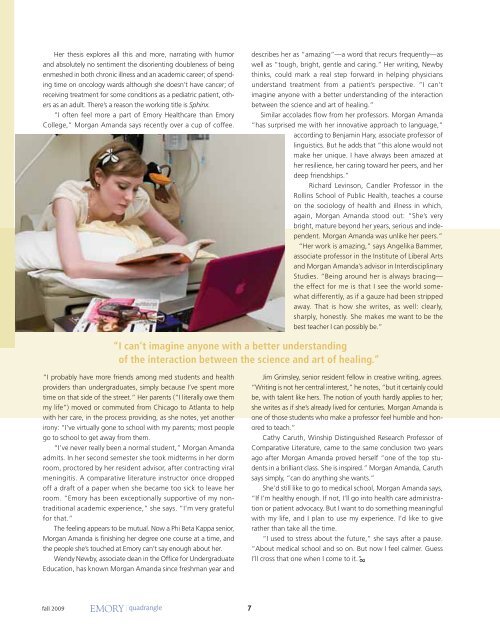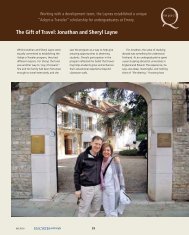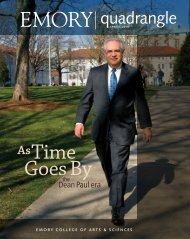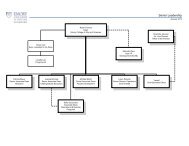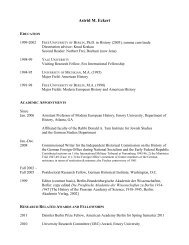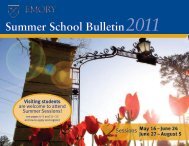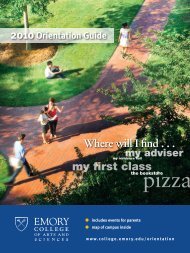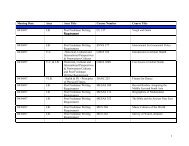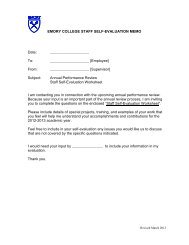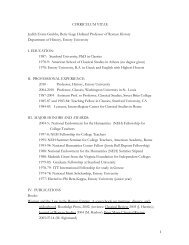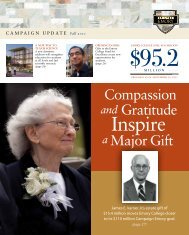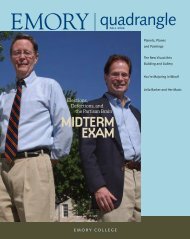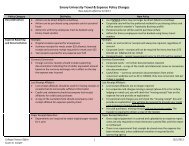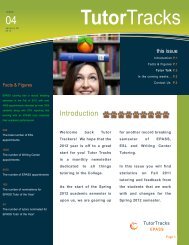quadrangle - Emory College - Emory University
quadrangle - Emory College - Emory University
quadrangle - Emory College - Emory University
- No tags were found...
You also want an ePaper? Increase the reach of your titles
YUMPU automatically turns print PDFs into web optimized ePapers that Google loves.
Her thesis explores all this and more, narrating with humorand absolutely no sentiment the disorienting doubleness of beingenmeshed in both chronic illness and an academic career; of spendingtime on oncology wards although she doesn’t have cancer; ofreceiving treatment for some conditions as a pediatric patient, othersas an adult. There’s a reason the working title is Sphinx.“I often feel more a part of <strong>Emory</strong> Healthcare than <strong>Emory</strong><strong>College</strong>,” Morgan Amanda says recently over a cup of coffee.describes her as “amazing”—a word that recurs frequently—aswell as “tough, bright, gentle and caring.” Her writing, Newbythinks, could mark a real step forward in helping physiciansunderstand treatment from a patient’s perspective. “I can’timagine anyone with a better understanding of the interactionbetween the science and art of healing.”Similar accolades flow from her professors. Morgan Amanda“has surprised me with her innovative approach to language,”according to Benjamin Hary, associate professor oflinguistics. But he adds that “this alone would notmake her unique. I have always been amazed ather resilience, her caring toward her peers, and herdeep friendships.”Richard Levinson, Candler Professor in theRollins School of Public Health, teaches a courseon the sociology of health and illness in which,again, Morgan Amanda stood out: “She’s verybright, mature beyond her years, serious and independent.Morgan Amanda was unlike her peers.”“Her work is amazing,” says Angelika Bammer,associate professor in the Institute of Liberal Artsand Morgan Amanda’s advisor in InterdisciplinaryStudies. “Being around her is always bracing—the effect for me is that I see the world somewhatdifferently, as if a gauze had been strippedaway. That is how she writes, as well: clearly,sharply, honestly. She makes me want to be thebest teacher I can possibly be.”“I can’t imagine anyone with a better understandingof the interaction between the science and art of healing.”“I probably have more friends among med students and healthproviders than undergraduates, simply because I’ve spent moretime on that side of the street.” Her parents (“I literally owe themmy life”) moved or commuted from Chicago to Atlanta to helpwith her care, in the process providing, as she notes, yet anotherirony: “I’ve virtually gone to school with my parents; most peoplego to school to get away from them.“I’ve never really been a normal student,” Morgan Amandaadmits. In her second semester she took midterms in her dormroom, proctored by her resident advisor, after contracting viralmeningitis. A comparative literature instructor once droppedoff a draft of a paper when she became too sick to leave herroom. “<strong>Emory</strong> has been exceptionally supportive of my nontraditionalacademic experience,” she says. “I’m very gratefulfor that.”The feeling appears to be mutual. Now a Phi Beta Kappa senior,Morgan Amanda is finishing her degree one course at a time, andthe people she’s touched at <strong>Emory</strong> can’t say enough about her.Wendy Newby, associate dean in the Office for UndergraduateEducation, has known Morgan Amanda since freshman year andJim Grimsley, senior resident fellow in creative writing, agrees.“Writing is not her central interest,” he notes, “but it certainly couldbe, with talent like hers. The notion of youth hardly applies to her;she writes as if she’s already lived for centuries. Morgan Amanda isone of those students who make a professor feel humble and honoredto teach.”Cathy Caruth, Winship Distinguished Research Professor ofComparative Literature, came to the same conclusion two yearsago after Morgan Amanda proved herself “one of the top studentsin a brilliant class. She is inspired.” Morgan Amanda, Caruthsays simply, “can do anything she wants.”She’d still like to go to medical school, Morgan Amanda says,“If I’m healthy enough. If not, I’ll go into health care administrationor patient advocacy. But I want to do something meaningfulwith my life, and I plan to use my experience. I’d like to giverather than take all the time.“I used to stress about the future,” she says after a pause.“About medical school and so on. But now I feel calmer. GuessI’ll cross that one when I come to it.”fall 2009 7


